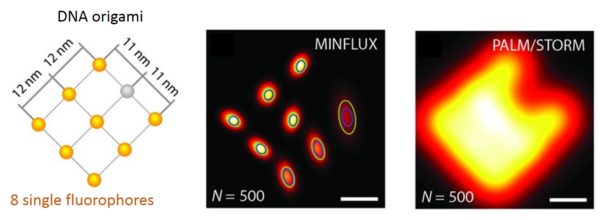Fluorescence nanoscopy is revolutionizing biological imaging because it keeps all the advantages of fluorescence-based imaging (specificity, sensitivity, low-invasiveness) but provides a spatial resolution no longer limited by diffraction. Although theoretically, all these methods provide unlimited resolution, in practice they are limited by the photostability of fluorophores. The limited photon budget determines the achievable resolution. That is why it makes sense to try to get the most out of the few fluorescence photons available from each molecule…
In our recent paper published in Science, we present MINFLUX, a new method to determine the position of single fluorescent molecules with highest precision using a minimum number of photons. For example, MINFLUX reaches a precision of 50 nm with just 9 photons! Using a few thousands of photons, as it is usually possible with a good single dye, MINFLUX achieves a localization precision of 1 nm! That is the ultimate spatial resolution physically meaningful for an optical method because it reaches the size of the photon source, i.e. the conjugated system of the molecule that emits the visible photon.

MINFLUX can be used to obtain super-resolved fluorescence images with unprecedented resolution, as shown in the Figure for a DNA origami with 8 fluorophores separated by distances of ~10 nm. MINFLUX can also be used for most efficient single-molecule tracking measurements.
MINFLUX was developed in the laboratory of Prof. Stefan W. Hell in Göttingen, as the main project of postdoc Francisco Balzarotti, directed by Prof. Hell and co-directed by Prof. Stefani within the framework of a Max-Planck Partner Group. We are working hard to have the second MINFLUX system running in Buenos Aires as soon as possible.
We believe MINFLUX will set the road for a new generation of nanoscopy methods.
“Nanometer resolution imaging and tracking of fluorescent molecules with minimal photon fluxes”
Francisco Balzarotti, Yvan Eilers, Klaus C. Gwosch, Arvid H. Gynma, Volker Westphal, Fernando D. Stefani, Johan Elf, Stefan W. Hell
MINFLUX on some international news:



